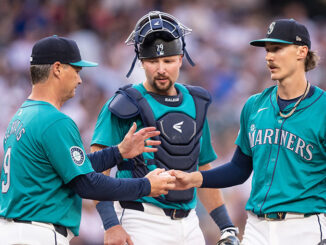
The achievement of Ichiro doesn’t reside in his impressive stats or time-tested career, but rather in the revolutionary role he played in the globalization of baseball. Other Japanese players integrated into the MLB before Ichiro, but nobody had the success, impact, or astonishing influence that he did.
It’s hard to remember now, with so many high-profile Japanese players coming over to the MLB in recent seasons, but it was a league-shaking decision by the Mariners leadership to sign him back in 2001.
At that time, he was already one of the most exceptional players in the Japan Pacific League, and from a stats perspective, he was breathtaking. In his last season in the JPPL, Ichiro hit .387 BA and .460 OBP (for context, in 2018 Betts hit .346/.438 and Trout hit .312/460), so, that’s impressive. Nevertheless, there was still mountains of skepticism about his skills translating to majors to overcome.
However, Ichiro quickly silenced the critics and opened the league’s eyes to the talent from across the Pacific. Over his first 10 seasons with the Seattle Mariners he averaged a .331 BA, topping out at .372/.414 in 2004, and averaged 159 games per season. Starting with winning the Rookie of the Year award, he went on to be a 10 time All-Star, league MVP, and he collected 10 Gold Gloves, three Silver Sluggers, and two Batting Titles – along with 3,000+ hits – over his storied career. Not to mention he had dozens of legendary plays—like the laser from right field to third—that pepper the Mariners’ jumbotron highlight reel to this day.
Clearly, this Hall-of-Fame caliber career is impressive all on its own, but his stats and accomplishments only serve to fully contrast his real impact on the game.
Last year, Major League Baseball witnessed a multi-team bidding war to sign Japanese pitcher/hitter Shohei Ohtani, with the Los Angeles Angels besting their competition and acquiring the multi-position rising-star. Recently, the Seattle Mariners signed Japanese pitcher Yusei Kikuchi, which both brings back a flood of memories from 2001, but also signals another vote of confidence in Japanese players and their ability to adapt to American baseball.
Like Jackie Robinson shattering the color-barrier before him, Ichiro has fundamentally altered the MLB’s perspective toward players from Japan and the greater Asia region for better and for always. Outside of Masanori Murakami in 1964, nine other Japanese players from 1995 to 2001 made it to the MLB before Ichiro; but his incredible performance on the field kicked the doors wide-open for more than 40 players since. That’s an accomplishment that very few others can claim.
Ichiro (45), is still an active player for the Mariners and has indicated an intention to play in the 2019 season. However, after just 15 games last year he left the clubhouse to become the Special Assistant to the Chairman in the front office. Under the bright lights of the Tokyo Dome, the Seattle Mariners and the Oakland Athletics will kick off their upcoming seasons with a pair of International Exhibition games against Japanese teams followed by a two-game series against each other.
Regardless of the outcome of those games, or Ichiro’s performance itself, the powerful message can’t be denied or diminished: Ichiro is returning home a champion that transformed the game.




